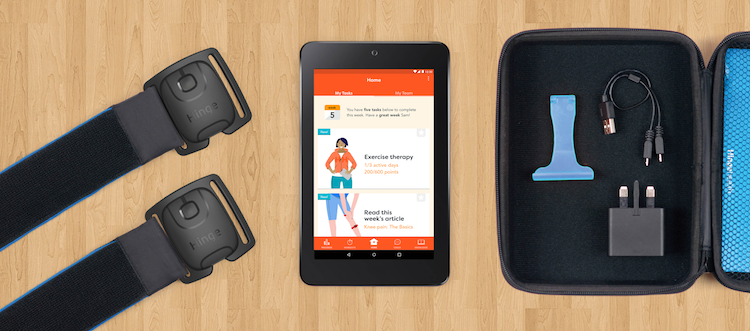Startup Nets $8 Million in Series A Investment to Treat, Prevent Musculoskeletal Injuries
Hinge Health is working to create remote physical therapy and behavioral health treatment options using wearables and software.

A San Francisco and London-based health startup has received $8 million in Series A investment to develop technology to combat musculoskeletal (MSK) injuries.
The company, Hinge Health, made the announcement in a news release earlier this week. Hinge Health said that the international venture capital firm, Atomico, led the Series A investment with all seed investors also contributing. Carolina Brochado, an Atomico partner, will now sit on the Hinge Health board, according to the news release.
Hinge Health is working to create remote physical therapy and behavioral health treatment using wearables and software. The new stream of funding will support development of new products to address lower back and knee pain as well as create new programs to treat hip, shoulder, and neck pain. Current Hinge Health kits include two wearables with motion sensors, a tablet loaded with Hinge software, and some tablet accessories.
Hinge Health sees itself addressing an unmet healthcare need with its devices and software — a view that seems to be supported by data from the Centers for Disease Control and Prevention (CDC).
The CDC estimated in 2001 that the median number of workdays missed by American workers due to MSK injuries stood at 8. Injuries of this variety accounted for 70 million visits to physicians during the same time, also representing an estimated 130 million health care encounters.
For record-keeping purposes, the Bureau of Labor Statistics of the Department of Labor considers MSK injuries to be:
- Tears, sprains, and strains within the musculoskeletal system and connective tissue.
- Back pain.
- Carpel tunnel syndrome.
- Hernia.
Injuries or disorders called by slips, trips, or falls are not included in the CDC’s estimates.
In its news release, Hinge Health said that it has data on 1,000 patients. Using that data, the company said it has seen chronic knee and low-back pain improve by 50%. The software and data have also helped patients avoid 60% of surgeries, Hinge Health said.
Hinge Health co-founder and CEO Daniel Perez highlighted the need for more evidence to support clinical guidelines for MSK injuries, as well as more support for patient adherence to non-surgical treatment options.
“The result is that patients are shunted onto opiates and eventually surgery,” Perez said. “Our vision to improve the scale, experience and ultimately outcomes for patients by using technology to better deliver evidence-based care, with MSK as our first beachhead.”
Hinge Health had previously received $1.3 million during a seed round that concluded in June 2016, bringing its total funding level to $10 million, the company said.
Related
Google Glass Wants to be Your EHR Solution
Sticky Situation: New Nanomesh for Wearables is Safer, Comfortable, Researchers Say
Children’s hospitals face complex challenges dealing with disasters
April 18th 2025Pediatric hospitals deal with different factors in weather-related events and other emergencies. Terri Wilson of the Children’s Hospital Association talks about the challenges and the need for more planning and support.
Telehealth faces a looming deadline in Washington | Healthy Bottom Line podcast
February 12th 2025Once again, the clock is ticking on waivers for telemedicine and hospital-at-home programs. Kyle Zebley of the American Telemedicine Association talks about the push on Congress and the White House.